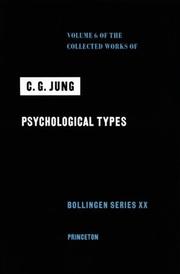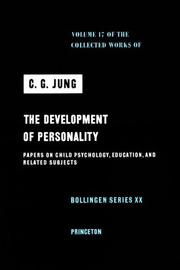| Listing 1 - 2 of 2 |
Sort by
|

ISBN: 0691097704 9780691097701 140085086X Year: 2014 Publisher: Princeton, NJ : Princeton University Press,
Abstract | Keywords | Export | Availability | Bookmark
 Loading...
Loading...Choose an application
- Reference Manager
- EndNote
- RefWorks (Direct export to RefWorks)
One of the most important of Jung's longer works, and probably the most famous of his books, Psychological Types appeared in German in 1921 after a "fallow period" of eight years during which Jung had published little. He called it "the fruit of nearly twenty years' work in the domain of practical psychology," and in his autobiography he wrote: "This work sprang originally from my need to define the ways in which my outlook differed from Freud's and Adler's. In attempting to answer this question, I came across the problem of types; for it is one's psychological type which from the outset determines and limits a person's judgment. My book, therefore, was an effort to deal with the relationship of the individual to the world, to people and things. It discussed the various aspects of consciousness, the various attitudes the conscious mind might take toward the world, and thus constitutes a psychology of consciousness regarded from what might be called a clinical angle." In expounding his system of personality types Jung relied not so much on formal case data as on the countless impressions and experiences derived from the treatment of nervous illnesses, from intercourse with people of all social levels, "friend and foe alike," and from an analysis of his own psychological nature. The book is rich in material drawn from literature, aesthetics, religion, and philosophy. The extended chapters that give general descriptions of the types and definitions of Jung's principal psychological concepts are key documents in analytical psychology.
Personality --- Typology (Psychology) --- Personality. --- Mental types --- Psychological types --- Type (Psychology) --- Types, Mental --- Types, Psychological --- Characters and characteristics --- Psychology --- Temperament --- Personal identity --- Personality psychology --- Personality theory --- Personality traits --- Personology --- Traits, Personality --- Individuality --- Persons --- Self --- Abstraction. --- Academic psychologist. --- Aestheticism. --- Affect (psychology). --- Allegory of the Cave. --- Analogy. --- Analytical psychology. --- Antithesis. --- Arthur Schopenhauer. --- Carl Jung. --- Causality. --- Celtic mythology. --- Certainty. --- Cognition. --- Concept. --- Conscience. --- Consciousness. --- Critical psychology. --- Criticism. --- Delusion. --- Determination. --- Disposition. --- Dissociation (psychology). --- Doctrine. --- Dynamism (metaphysics). --- Empathy. --- Existence. --- Explanation. --- Externalization. --- Extraversion and introversion. --- Fanaticism. --- Feeling. --- Good and evil. --- Hatred. --- Idealism. --- Imagination. --- Individual psychology. --- Individual. --- Individualism. --- Inference. --- Inferiority complex. --- Intellect. --- Intellectualism. --- Introjection. --- Irrationality. --- Lecture. --- Libido. --- Materialism. --- Mental disorder. --- Morality. --- Multitude. --- Nature. --- Neurosis. --- Nominalism. --- Objectivity (philosophy). --- Observation. --- Overreaction. --- Paragraph. --- Parapsychology. --- Participation mystique. --- Perception. --- Personal equation. --- Phenomenon. --- Philosopher. --- Philosophy. --- Physiognomy. --- Potentiality and actuality. --- Prejudice. --- Principle. --- Protestantism. --- Psyche (psychology). --- Psychiatrist. --- Psychic. --- Psychoanalysis. --- Psychological Types. --- Psychologist. --- Psychology of the Unconscious. --- Psychology. --- Psychotherapy. --- Rationality. --- Reality. --- Reason. --- Religion. --- Requirement. --- Result. --- Rosicrucianism. --- Self-criticism. --- Sense. --- Spirituality. --- Stupidity. --- Suggestion. --- Symbols of Transformation. --- Symptom. --- Temperament. --- The Philosopher. --- Theory. --- Thought. --- Transference. --- Unconsciousness. --- Writing.

ISBN: 0691097631 9780691097633 1400850835 Year: 2014 Publisher: Princeton, NJ : Princeton University Press,
Abstract | Keywords | Export | Availability | Bookmark
 Loading...
Loading...Choose an application
- Reference Manager
- EndNote
- RefWorks (Direct export to RefWorks)
Papers on child psychology, education, and individuation, underlining the overwhelming importance of parents and teachers in the genesis of the intellectual, feeling, and emotional disorders of childhood. The final paper deals with marriage as an aid or obstacle to self-realization.
Individuality. --- Personality. --- Personal identity --- Personality psychology --- Personality theory --- Personality traits --- Personology --- Traits, Personality --- Psychology --- Individuality --- Persons --- Self --- Temperament --- Conformity --- Identity (Psychology) --- Likes and dislikes --- Personality --- Adult education. --- Adult. --- Analogy. --- Analytical psychology. --- Anthropomorphism. --- Anxiety dream. --- Anxiety. --- Aunt. --- Baynes. --- Bibliography. --- Calculation. --- Causality. --- Child development. --- Child's Dream Foundation. --- Circumcision. --- Collective unconscious. --- Conscience. --- Consciousness. --- Criticism. --- Curriculum. --- Deed. --- Delusion. --- Dementia praecox. --- Development of Personality. --- Developmental psychology. --- Disposition. --- Dream interpretation. --- Education. --- Explanation. --- Extraversion and introversion. --- Feeling. --- Homesickness. --- Homosexuality. --- Hypnosis. --- Hysteria. --- Idiot. --- Illustration. --- Imagination. --- Indication (medicine). --- Individualism. --- Individuation. --- Inference. --- Inferiority complex. --- Inquiry. --- Intellectual disability. --- Intellectual giftedness. --- Kinderseele. --- Lecture. --- Libido. --- Mental disorder. --- Morality. --- Motivation. --- Neurosis. --- Neuroticism. --- Obstacle. --- Oedipus complex. --- Of Education. --- Parapsychology. --- Participation mystique. --- Personal unconscious. --- Phenomenon. --- Pleasure principle (psychology). --- Prejudice. --- Professor. --- Psychiatric Studies. --- Psychiatry. --- Psychic. --- Psychoanalysis. --- Psychologist. --- Psychology. --- Psychopathology. --- Psychophysics. --- Psychotherapy. --- Puberty. --- Rundschau. --- Self-consciousness. --- Self-knowledge (psychology). --- Seminar. --- Seriousness. --- Sexual intercourse. --- Sexual repression. --- Sigmund Freud. --- State of affairs (sociology). --- Sublimation (psychology). --- Suggestion. --- Symbols of Transformation. --- Symptom. --- Technische Hochschule. --- The Collected Works of C. G. Jung. --- The Other Hand. --- Theory. --- Therapeutic effect. --- Thought. --- Transference. --- Uncertainty. --- Unconsciousness. --- Uniqueness. --- Vocation (poem). --- Writing.
| Listing 1 - 2 of 2 |
Sort by
|

 Search
Search Feedback
Feedback About UniCat
About UniCat  Help
Help News
News